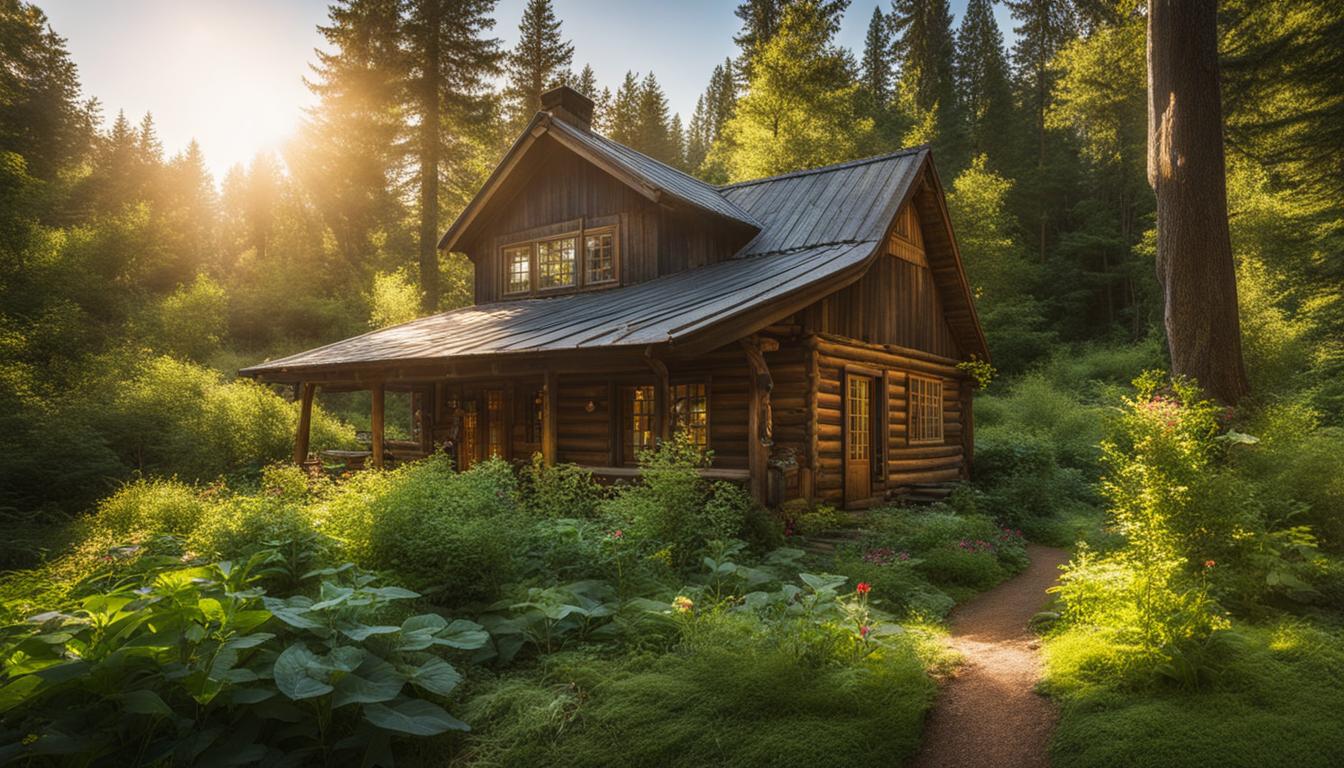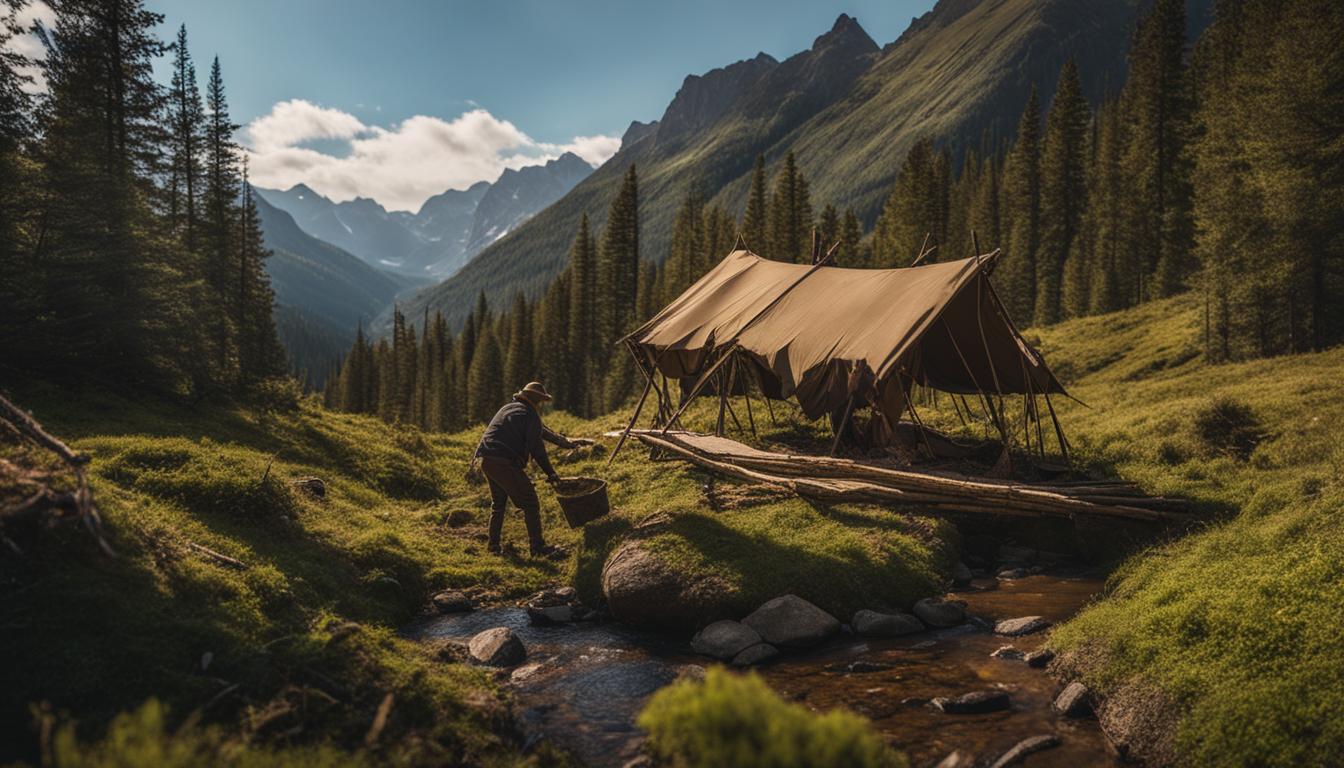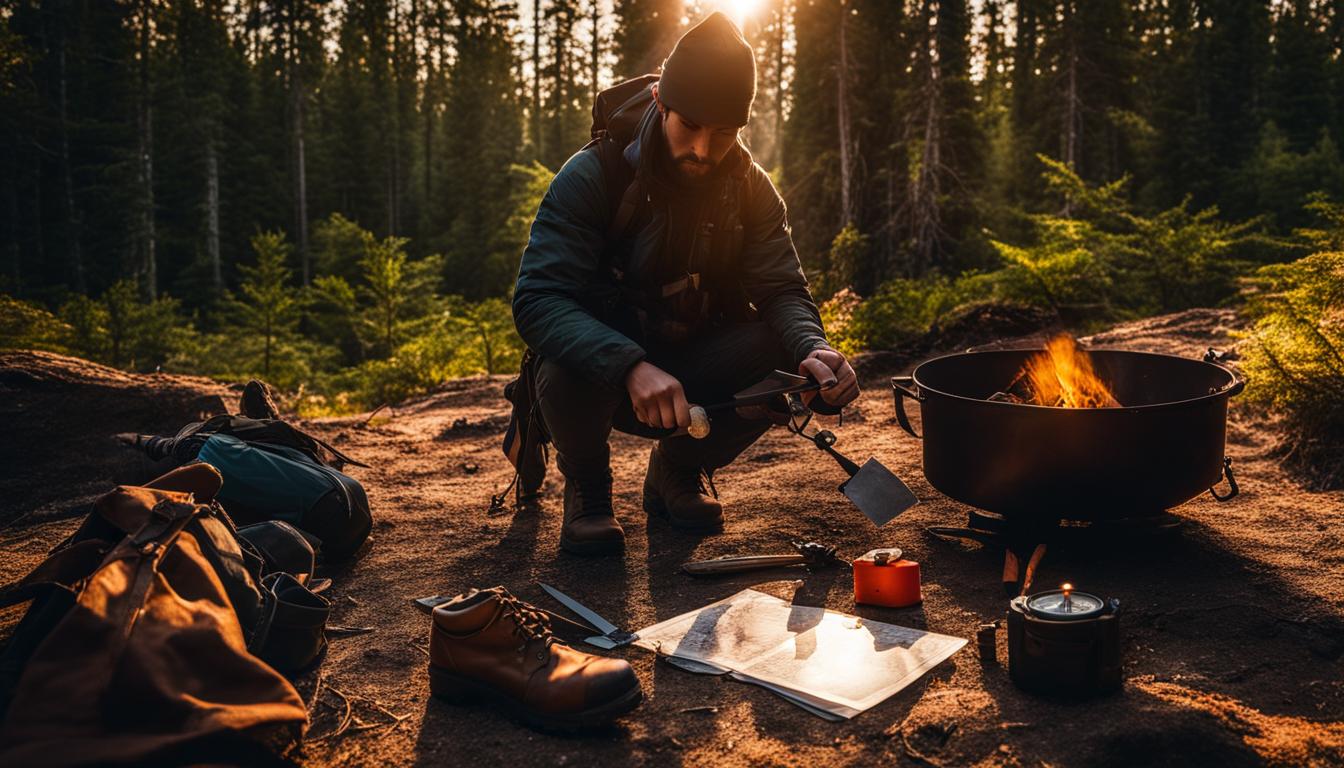Welcome to our comprehensive guide on off-grid living! If you’re seeking to liberate yourself from the limitations of conventional utilities and adopt a more environmentally friendly, self-reliant lifestyle, you’ve landed in the right spot. Living off the grid presents a special chance to disconnect from the traditional system and involve yourself in a realm of renewable energy, sustainable agriculture, eco-conscious living, tiny homes, homesteading, alternative energy, and green living.
- Living off the grid allows you to disconnect from traditional utilities and embrace a more sustainable and self-sufficient lifestyle.
- Choosing the right location is crucial for off-grid living, considering factors such as legality, resources, and accessibility.
- Building a small and efficient home, such as a tiny home, is essential for minimizing resource dependency.
- Harnessing solar power and solar hot water systems can provide sustainable and reliable energy sources.
- Embracing sustainable food production through organic gardening and raising livestock is key for self-sufficiency.
Are you ready to dive into the world of off-grid living? Let’s explore how you can find the perfect location, build a sustainable home, harness renewable energy, cultivate your own food, and connect with the off-grid community. Get ready to embrace the freedom and resilience that off-grid living offers!
Find the Right Location
When it comes to off-grid living, finding the right location is crucial. You want to ensure that your chosen property aligns with the principles of sustainability and self-sufficiency. Here are some factors to consider when searching for the perfect off-grid location:
- Legality: Check local regulations and zoning laws to ensure that off-grid living is permitted in the area. Some regions may have restrictions or specific requirements for alternative living.
- Distance from urban areas: Determine how far you’re willing to be from urban amenities and services. Consider the trade-off between seclusion and access to essentials like groceries and healthcare.
- Cost: Consider the cost of land in different locations. Prices can vary significantly depending on factors such as proximity to cities, availability of resources, and land size.
- Availability of resources: Evaluate the availability of key resources like sunlight for solar power, access to clean water sources, and suitable soil for growing food.
- Accessibility: Assess the accessibility of the property. Consider factors like road conditions, distance from major highways, and the feasibility of construction and maintenance.
Additionally, it’s important to choose a location that aligns with your specific goals and needs. If you plan to cultivate a large garden or raise livestock, you’ll need ample land. On the other hand, if you prefer a simpler lifestyle with fewer responsibilities, a smaller property may be more suitable. Assessing these factors will help you find the perfect location to start your off-grid journey.
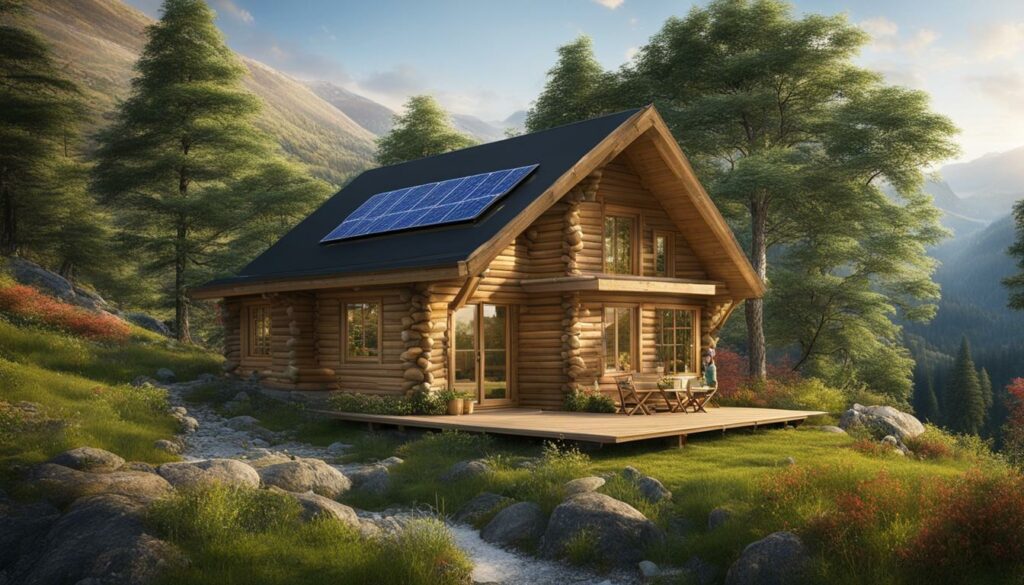
Table: Comparison of Potential Off-Grid Locations
| Location | Legality | Distance from Urban Areas | Cost | Availability of Resources | Accessibility |
|---|---|---|---|---|---|
| Rural A | Allowed with restrictions | 30 miles | $50,000 | Sunlight, clean water, fertile soil | Paved road, 1 mile from highway |
| Mountain B | No restrictions | 15 miles | $70,000 | Moderate sunlight, nearby stream | Gravel road, 2 miles from highway |
| Desert C | Allowed with permits | 50 miles | $30,000 | Abundant sunlight, limited water | Off-road, 5 miles from highway |
Note: The table above provides a general comparison of potential off-grid locations, showcasing key factors to consider. Costs and availability of resources may differ based on specific properties within each location. It is essential to conduct thorough research and visit potential sites before making a final decision.
Build the Smallest Home Possible
When it comes to off-grid living, building a small and efficient home is key. Tiny homes offer a minimalistic and eco-friendly living space that is less dependent on resources. By embracing the concept of tiny homes, we can reduce our carbon footprint and live a more sustainable lifestyle.
There are various types of off-grid dwellings to consider, such as cabins, shipping containers, trailers, or tiny homes on wheels. Each option has its own advantages and can be customized to suit your needs and preferences. The key is to design your home with passive heating and cooling in mind, utilizing natural building materials and efficient insulation.
“Living in a tiny home allows us to live with only the essentials, simplifying our lives and reducing our consumption. It’s a conscious choice to downsize and prioritize what truly matters to us,” says Jane, a proud owner of a tiny home.
In addition to building a small home, optimizing space is crucial. Incorporate multi-functional areas and clever storage solutions to make the most of your limited square footage. Consider innovative design ideas, such as loft beds, hidden storage compartments, and foldable furniture. By maximizing the usability of your space, you can create a comfortable and functional living environment.
| Type of Off-Grid Dwelling | Advantages |
|---|---|
| Tiny Homes on Wheels | Portability and flexibility |
| Shipping Containers | Durability and affordability |
| Cabins | Natural aesthetic and rustic charm |
By building the smallest home possible, we not only reduce our impact on the environment but also save money on construction and maintenance costs. The freedom and simplicity that comes with minimalistic living can bring us closer to nature and help us appreciate the things that truly matter in life.
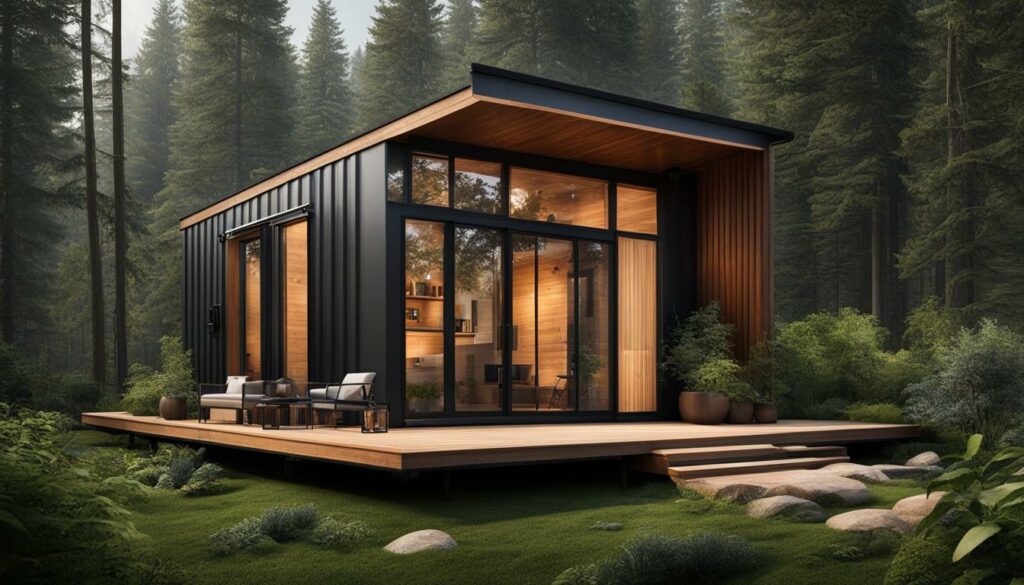
Install Off-grid Solar Power and Solar Hot Water Systems
Harnessing solar power is a crucial aspect of off-grid living. We understand the importance of renewable energy in sustaining a self-sufficient lifestyle. That’s why we recommend installing off-grid solar power systems to meet your energy needs. By utilizing solar panels, you can generate clean and sustainable electricity for your off-grid home.
When it comes to choosing a solar power system, it’s essential to assess your energy requirements. Consider the size of your off-grid home and the appliances you’ll need to power. This evaluation will help determine the number and capacity of solar panels needed for optimal energy production. Additionally, take into account the reliability and efficiency of the solar power brand you choose, as well as any available government incentives.
Alongside solar power, incorporating solar hot water systems can further enhance the sustainability of your off-grid lifestyle. These systems utilize the sun’s energy to heat water, reducing the reliance on traditional heating methods. Paired with portable solar panels, you can optimize the efficiency of your solar hot water system, providing an eco-friendly and cost-effective solution for all your hot water needs.
| Solar Power System | Benefits |
|---|---|
| Reduces dependence on traditional utilities |
|
| Solar Hot Water System |
|
Embrace Sustainable Food Production
Living off the grid goes hand in hand with embracing sustainable food production. By cultivating an organic garden, raising backyard livestock, and exploring food preservation techniques, we can ensure a self-sufficient and eco-friendly lifestyle. Here are some key practices to consider:
Organic Gardening
Growing your own food organically allows you to have full control over what you put on your plate. Choose crops that are suitable for your climate and soil conditions, and use natural fertilizers and pest control methods to maintain a healthy garden. Consider techniques such as permaculture, vertical gardening, and companion planting to maximize yield and optimize space.
Backyard Livestock
Raising livestock not only provides a source of fresh eggs, milk, and meat but also contributes to a regenerative agricultural system. Start small with chickens for eggs or consider goats for milk. It’s essential to provide them with a suitable shelter, proper nutrition, and enough space to roam. Remember to research local regulations and ensure you have the necessary permits.
Food Preservation
Preserving your harvest allows you to enjoy homegrown produce throughout the year, reducing food waste and reliance on external sources. Learn about canning, fermenting, dehydrating, and other preservation methods to make the most of your abundance. Experiment with different recipes and techniques to create a pantry stocked with nutritious and delicious food.
Table: Benefits of Sustainable Food Production
| Benefits | Description |
|---|---|
| Environmental Impact | By growing food organically and raising livestock sustainably, we reduce the use of synthetic chemicals, protect biodiversity, and conserve water resources. |
| Self-Sufficiency | Producing our own food reduces dependency on external food systems and provides a sense of security and self-reliance. |
| Health and Nutrition | Homegrown organic produce is rich in nutrients, free from harmful pesticides, and contributes to a healthier and more balanced diet. |
| Economic Savings | By growing our own food, we reduce grocery bills and can even generate additional income by selling excess produce or livestock products. |
| Connection to Nature | Engaging in sustainable food production fosters a deeper connection to the natural world, promoting mindfulness and well-being. |
Embracing sustainable food production in our off-grid lifestyle not only supports our self-sufficiency but also contributes to a healthier planet. By growing our own organic food, raising backyard livestock, and preserving our harvests, we create a more resilient and sustainable future for ourselves and generations to come.
Implement Responsible Waste Management
In our journey towards off-grid living, responsible waste management plays a crucial role. By embracing sustainable practices such as composting and recycling, we can minimize our environmental impact and create a closed-loop system. Let’s explore some effective methods to manage waste in an eco-friendly manner.
Composting
Composting is a natural process that converts organic waste into nutrient-rich soil. By composting food scraps, yard waste, and other biodegradable materials, we can reduce landfill waste and create a valuable resource for our gardens. Remember to add a mix of “green” materials like fruit and vegetable scraps, and “brown” materials like leaves and wood chips to maintain a proper balance. Turn the pile regularly and keep it moist to speed up decomposition. And voila! You’ll have nutrient-rich compost that will nourish your plants and help them thrive.
Recycling
Recycling is another essential component of responsible waste management. Separate recyclable materials such as paper, glass, plastic, and metal from your general waste. Check with your local recycling center to understand their guidelines and sorting requirements. By recycling these materials, you can contribute to the conservation of natural resources and reduce the carbon footprint associated with manufacturing new products. Remember, every little effort counts!
Alternative Solutions
In addition to composting and recycling, there are other alternative solutions to consider for waste management in an off-grid lifestyle. One such solution is vermiculture, which involves using worms to break down organic waste into rich vermicompost. This method is particularly useful for those with limited outdoor space. Another option is implementing a greywater system, which recycles and filters wastewater from sinks, showers, and washing machines for use in irrigation. These innovative solutions not only minimize waste but also promote sustainability and self-sufficiency.
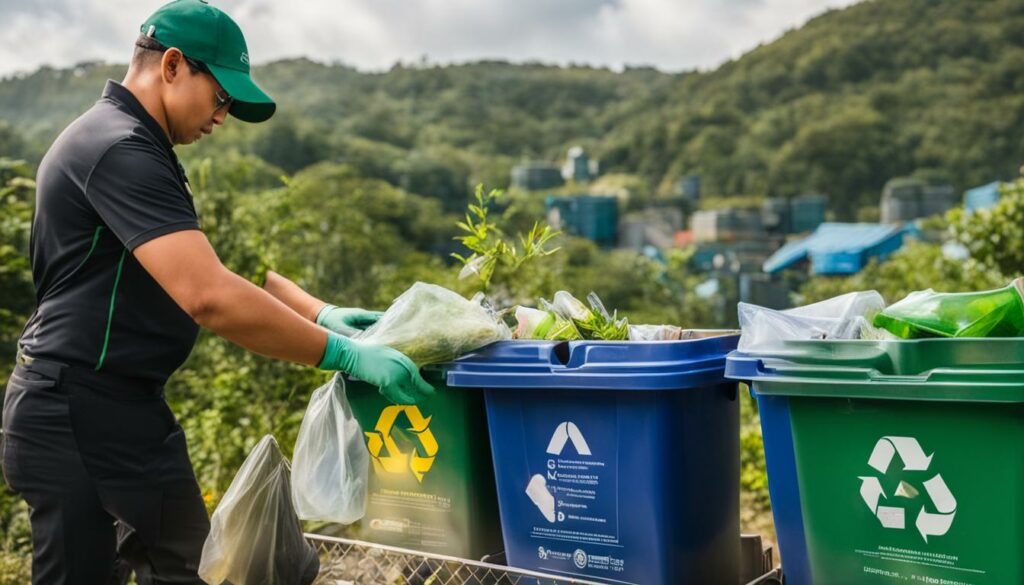
Let’s make a conscious effort to reduce waste in the first place by embracing a minimalist and sustainable lifestyle. By implementing responsible waste management practices, we can move closer to our goal of achieving a truly self-sufficient and eco-friendly off-grid life.
Develop Essential Skills
Living off the grid requires a wide range of essential skills to ensure a self-sufficient lifestyle. By acquiring and honing these skills, we can confidently maintain our off-grid living and embrace the sustainable lifestyle we desire. Let’s take a look at some of the key skills that are essential for off-grid living.
Carpentry
One of the most important skills to learn is carpentry. Being able to build and maintain structures on our property is crucial for our self-sufficiency. From constructing our own tiny homes to building sheds and furniture, having solid carpentry skills allows us to create functional and durable structures and objects.
Food Preservation
In an off-grid living scenario, preserving our food becomes essential. Learning various food preservation techniques such as canning, fermenting, and dehydrating enables us to store our harvest for extended periods. These skills not only help us maintain a constant food supply but also contribute to reducing waste and ensuring our self-sufficiency.
Electrical Knowledge
Understanding basic electrical knowledge is crucial for troubleshooting issues with our renewable energy systems. It empowers us to maintain and repair our solar panels, batteries, and other components. With a grasp of electrical principles, we can ensure our off-grid power system functions optimally, providing us with reliable and sustainable energy.
Summary
Developing these essential skills – carpentry, food preservation, and electrical knowledge – equips us with the tools necessary to thrive in an off-grid living environment. By mastering these skills, we become more self-reliant, self-sufficient, and capable of embracing the sustainable lifestyle we desire.
Connect with the Off-Grid Community
Living off the grid can sometimes feel like a solitary journey, but connecting with the off-grid community can provide invaluable support, inspiration, and a wealth of knowledge. By reaching out to like-minded individuals, we can form connections that nurture our sustainable lifestyle and promote the sharing of ideas and experiences. Building a network within the off-grid community allows us to learn from one another, troubleshoot challenges, and celebrate our victories together.
There are various ways to connect with the off-grid community. Online forums and social media groups dedicated to off-grid living provide platforms for discussion, advice, and information exchange. Joining these communities enables us to tap into a vast pool of expertise and connect with individuals who have similar goals and values.
“The off-grid community has been a source of endless support and encouragement for me. Whether I’m seeking advice on renewable energy solutions or looking for inspiration for sustainable food production, I can always rely on the wisdom and experience of my fellow off-gridders.”
In addition to virtual connections, attending local off-grid events and gatherings can provide opportunities for in-person connections. These events often feature workshops, demonstrations, and discussions on various aspects of off-grid living. By participating in these events, we can not only gain valuable knowledge but also forge meaningful connections with like-minded individuals who are on a similar journey.
Table: Benefits of Connecting with the Off-Grid Community
| Benefits | Description |
|---|---|
| Support | Receive guidance, advice, and emotional support from individuals who understand the challenges and triumphs of off-grid living. |
| Inspiration | Gain fresh ideas, innovative solutions, and inspiration from others who are embracing sustainable living. |
| Knowledge Exchange | Learn from the experiences and expertise of the off-grid community, expanding our own knowledge and skills. |
| Collaboration | Find opportunities for collaboration, whether it’s sharing resources, projects, or skills, to enhance our off-grid lifestyle. |
Connecting with the off-grid community not only provides practical benefits but also fosters a sense of camaraderie and shared purpose. Through these connections, we can find encouragement, motivation, and a network that supports our commitment to sustainable living.
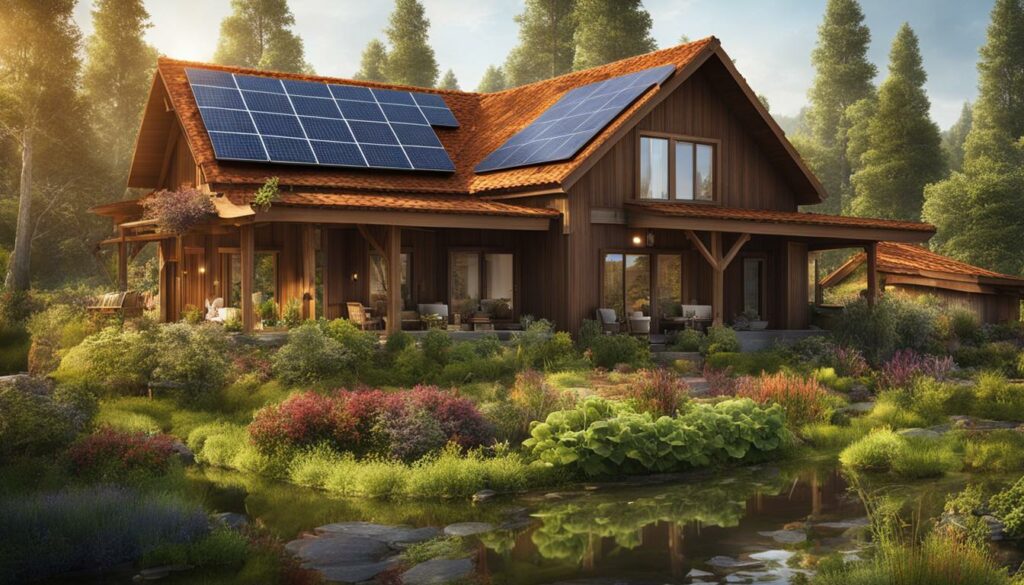
Embrace the Benefits of Off-Grid Living
Living off the grid offers a multitude of benefits that go beyond just a sustainable lifestyle. It provides a sense of freedom that is unmatched by traditional living arrangements. By disconnecting from the grid, we can break free from the constraints of society and live life on our own terms.
One of the major advantages of off-grid living is the reduced environmental impact. By generating our own renewable energy and embracing sustainable practices, we can minimize our carbon footprint and contribute to a healthier planet. We have the power to make a real difference in the fight against climate change.
Not only is off-grid living beneficial for the environment, but it also has positive effects on our health. By living closer to nature, we can enjoy cleaner air, access to organic food, and a more active lifestyle. The stress and pollution of city living are replaced by the tranquility and serenity of the great outdoors.
“Living off the grid allows us to take control of our energy usage, grow our own food, and reduce our reliance on external systems.”
Furthermore, off-grid living offers significant cost savings in the long run. While the initial investment may be higher, the ongoing expenses are greatly reduced. By generating our own energy and growing our own food, we can drastically reduce our monthly bills and achieve financial independence.
Living off the grid is not just a lifestyle choice, but a conscious decision to live in harmony with nature. It is a way of embracing self-sufficiency, reclaiming our freedom, and making a positive impact on the world around us. So why wait? Join us in embracing the benefits of off-grid living and unlock a world of possibilities.
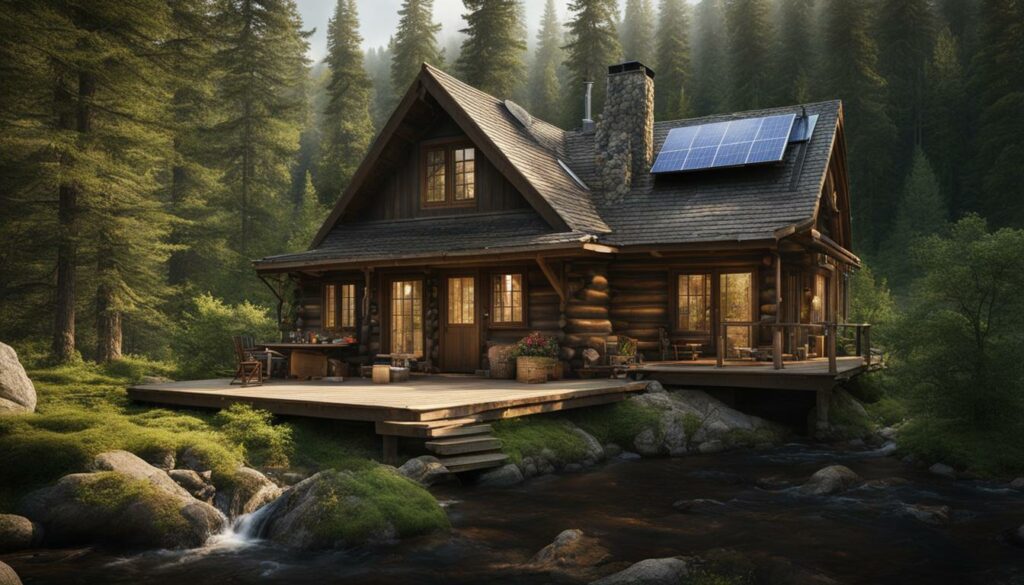
Benefits of Off-Grid Living:
- Freedom to live life on our own terms
- Reduced environmental impact
- Improved health and well-being
- Cost savings and financial independence
Embrace the benefits of off-grid living and start your journey towards a more sustainable and fulfilling lifestyle today.
In this Ultimate Guide, We’ll Explore the Minimum Requirements for Off-Grid Living
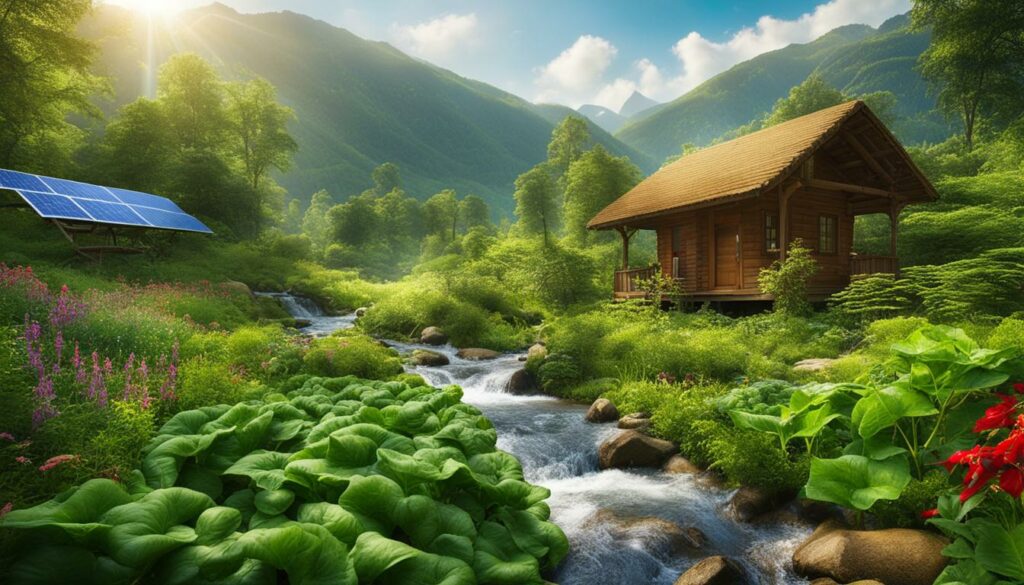
Living off the grid requires a few essential components to ensure sustainability and self-sufficiency. Let’s dive into the minimum requirements you need to start your off-grid living journey:
Land:
To live off the grid, you’ll need your own piece of land where you can build your sustainable home and establish your self-sufficient lifestyle. Look for a location that offers ample sunlight for solar power and access to a natural water source, such as a well or nearby stream.
Water System:
Access to water is crucial for off-grid living. Consider installing a rainwater capture system, digging a well, or utilizing nearby water sources. It’s essential to have a reliable and sustainable water supply for drinking, cooking, and irrigating your garden.
Power System:
Being off the grid means generating your own electricity. Invest in a reliable power system, such as solar panels or wind turbines, to harness renewable energy. This will provide you with the necessary power to run your home and appliances, ensuring a sustainable lifestyle.
Food Access:
To achieve self-sufficiency, you’ll need a plan for food access. Consider growing your own food through organic gardening or raising backyard livestock. Alternatively, establish relationships with local farmers and explore farmers’ markets to source fresh, sustainable produce.
| Minimum Requirements for Off-Grid Living | Description |
|---|---|
| Land | Your own piece of land to build your sustainable home and establish a self-sufficient lifestyle. |
| Water System | A reliable and sustainable water supply, such as a rainwater capture system or a well. |
| Power System | A renewable energy system, like solar panels or wind turbines, to generate electricity. |
| Food Access | A plan for growing your own food or sourcing sustainable produce locally. |
By meeting these minimum requirements, you’ll be well on your way to embracing the freedom and self-reliance that comes with off-grid living. Remember, it’s crucial to carefully consider each component and ensure its sustainability and compatibility with your lifestyle goals.
Conclusion
And with that, we have reached the end of our ultimate guide to off-grid living. We hope that this comprehensive journey has given you a glimpse into the incredible world of sustainable, self-sufficient living. By embracing off-grid living, we have the opportunity to disconnect from traditional utilities and reconnect with the natural rhythms of life.
Living off the grid allows us to take control of our energy consumption, grow our own food, and reduce our dependence on external systems. It offers a freedom that is unparalleled, allowing us to live intentionally and consciously. By harnessing renewable energy, building sustainable homes, and practicing responsible waste management, we can minimize our environmental impact and foster a healthier, more sustainable lifestyle.
As we conclude, we invite you to embark on your own off-grid journey. Find the right location, build a small and efficient home, harness solar power, grow your own food, and connect with the vibrant off-grid community. Embrace the benefits of off-grid living and experience the joy of living in harmony with nature. Remember, off-grid living may not be easy, but the rewards are immeasurable and the sense of fulfillment is beyond compare.
How can Off-Grid Living and Stealth Camping be Combined for the Ultimate Adventure?
Experience the ultimate adventure with off-grid living and stealth camping combined for the ultimate subaru outback camping. Embrace nature, freedom, and self-sufficiency while exploring remote areas in your Subaru Outback. Connect with the great outdoors and immerse yourself in the thrill of off-grid living and stealth camping.
How Can Off-Grid Living Prepare Me for Solo Tent Camping Adventures?
Living off-grid can help prepare you for solo tent camping adventures by teaching you essential survival skills. By learning to rely on yourself and your environment, you’ll gain the confidence and experience needed to thrive in remote areas during solo tent camping adventures.
FAQ
What is off-grid living?
Off-grid living refers to a lifestyle in which individuals or households disconnect from traditional utilities and rely on self-sustaining resources for their energy, water, and food needs.
Why would someone choose to live off the grid?
People choose off-grid living for various reasons, including a desire for sustainability, self-sufficiency, a closer connection to nature, and a reduced environmental impact.
How do I find the right location for off-grid living?
When searching for a location, consider factors such as legality, distance from urban areas, cost, availability of resources, accessibility, ample sunlight, and access to a natural water source.
What type of home should I build for off-grid living?
Building a small and efficient home, such as a tiny home, cabin, shipping container, or trailer, is key. Design your home with passive heating and cooling in mind, using natural materials and efficient insulation.
How can I harness solar power for off-grid living?
Assess your energy needs and determine the size of the solar system required. Consider the cost, government incentives, and reliability of the brand. Install solar hot water systems for sustainable water heating.
How can I produce my own food off-grid?
Embrace sustainable food production by cultivating an organic garden, raising backyard livestock, and utilizing food preservation techniques. Choose suitable crops, practice permaculture, and learn food preservation methods.
What are some responsible waste management practices for off-grid living?
Embrace composting and recycling to minimize environmental impact. Set up recycling systems and consider alternative waste disposal methods such as vermiculture or greywater systems.
What essential skills are needed for off-grid living?
Learn basic carpentry skills for building and maintenance, acquire food preservation knowledge, and familiarize yourself with basic electrical knowledge to troubleshoot renewable energy systems.
How can I connect with the off-grid community?
Reach out to like-minded individuals through online forums, social media groups, or local events. Join or create local off-grid communities to foster knowledge-sharing and support.
What are the benefits of off-grid living?
Off-grid living offers a sense of freedom, reduced environmental impact, a healthier lifestyle, and cost efficiency. It allows for greater energy control, food self-sufficiency, and a simpler way of life.
What are the minimum requirements for off-grid living?
You will need your own land, access to water (from a well, stream, or rainwater capture), a reliable power system (such as solar generators), and a plan for food access (growing your own or sourcing locally).

